Decentralized exchanges (DEXs) are booming as DeFi adoption is on fire, and your decision on a DEX development company can make or break your venture. Decentralized exchange development firms are vying with each other to offer secure, high-performance trading platforms. We’ve sifted through client reviews, case studies, and tech capabilities to identify the leading DEX development companies in 2026. Our analysis factors in blockchain expertise, core DEX features (AMMs, liquidity pools, staking, cross-chain swaps, etc.), security/auditing prowess, and post-launch support.
Highlights from our research:
- We evaluated developers’ track records and client feedback (Clutch, GoodFirms) to find those with proven DEX experience.
- Key vendor capabilities include multi-chain/blockchain experience (Ethereum, BNB Chain, Solana, Polygon), built-in AMMs and staking modules, smart contract audits, and compliance readiness.
- We were looking for vendors that offer both decentralized exchange development services and white-label products, with a balance between customization and speed-to-market.
- Emerging trends like cross-chain trading, AI-based market-making, and user gamification are shaping up in DEX platforms – we emphasize which vendors are leading in these areas.
With this guide, you’ll get a snapshot of each top DEX partner and the criteria for choosing one that fits your vision and budget.
Build your DEX with confidence!
Talk to our blockchain experts to launch a secure, scalable decentralized exchange
Table of contents:
- How to Choose the Right DEX Development Company
- Top DEX Development Companies in 2025
- Key Trends Driving DEX Development in 2025 and Beyond
- Final Tips Before Partnering With a DEX Developer
- Conclusion
How to Choose the Right DEX Development Company
Before jumping to vendor comparisons, set a clear decision framework. A great decentralized exchange development company should check these boxes:
DeFi & Blockchain Experience
Look for proven DEX expertise. Seasoned teams deeply understand smart-contract logic and AMM models. For example, IdeaSoft has experience with building high-throughput DEXs with thousands of TPS (for instance, in its Securitize and Biteeu projects). Ask them about protocols they have experience with (Ethereum, BNB Chain, Polygon, Solana, and so forth) and test projects (DEXs, DeFi platforms, token exchanges).
Core DEX Features
Ensure the vendor possesses the features you need. Top DEX developers offer automated market makers (liquidity pools), order-matching engines, yield farming/staking modules, cross-chain bridges/swaps, token launchpads, and nicely designed UI/UX. For instance, IdeaSoft’s DEX solutions feature secure trading smart contracts, AMM liquidity pools, staking integration, and multi-chain swaps. Ensure their platform supports limit orders, dynamic fees, or advanced order types.
Security & Auditing
Security is not negotiable. The perfect partner has a security-centric approach. That means end-to-end smart contract audits (by the likes of CertiK, Hacken), thorough penetration testing, and bug bounty initiatives. Make sure they enable the KYC/AML module integration or follow compliance rules. Sound KYC integration makes a DEX FATF-compliant, which minimizes regulatory risk and maximizes user trust.
Customization vs White-Label Solutions
Decide if you need an entirely custom build or a white-label. White-label DEX solutions require much less development time and cost. White-label DEX kits can be 2× cheaper and faster to market. But custom builds let you define every aspect (UI, features, scaling).
Weigh the trade-offs. White-label is great for MVPs or extremely tight budgets. Custom is best if you need custom tokenomics or future-proofing.
Post-Launch Support
DEX platforms don’t remain static. Your vendor should offer support with: regular security patches, performance optimization, and feature upgrades. Inquire SLA promises and scaling tactics (new chains, more traffic). Integrating compliance “as code” into DevOps is growing in popularity – proof that brilliant developers will bake in monitoring and auto-risk-checking.
Client Portfolio & Reviews
Examine their track record through portfolio and independent reviews. Companies like to showcase showpiece projects or case studies (e.g. insurance DEXs, token exchanges). Search Clutch, G2, or GoodFirms for peer reviews and ratings on DEX projects. A highly praised agency on Clutch for DEX dev will have references you can verify. Remember: consistent 4.0+ ratings and positive peer feedback are trust signals.
Top DEX Development Companies in 2025
Ranking by our measure of innovation, client testimonials, and services, below are the top vendors (in no particular order).
IdeaSoft
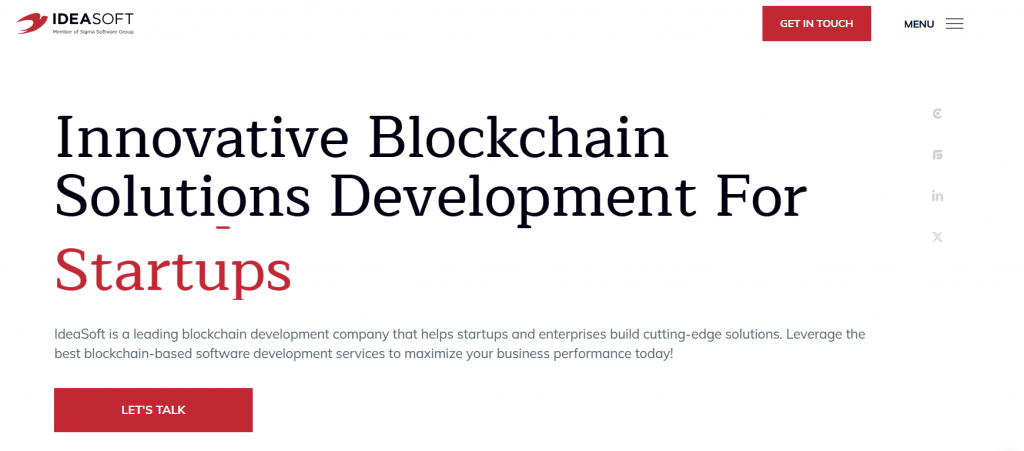
- Headquarters & Founded: IdeaSoft is a web3 / blockchain development company founded in 2016. They maintain development centers in Ukraine and have an EU and UAE presence.
- DEX/Exchange Services: IdeaSoft positions itself as a decentralized exchange development company offering end-to-end DEX and crypto exchange solutions.
- Industries: FinTech, financial services, crypto & DeFi, Healthcare, AgTech, Logistics, Smart City, Retail, Social Media, B2B / B2G.
- Notable Projects: Biteeu, Securitize, Dollet Wallet, Asymetrix, BridgeMutual.
- Trust Triggers: over 250+ successfully delivered projects in blockchain, fintech, enterprise and government domains. Strong client testimonials — for example, NEAR Foundation, Crédit Agricole, and others praising responsiveness, domain understanding, and team flexibility
Technorely Inc.
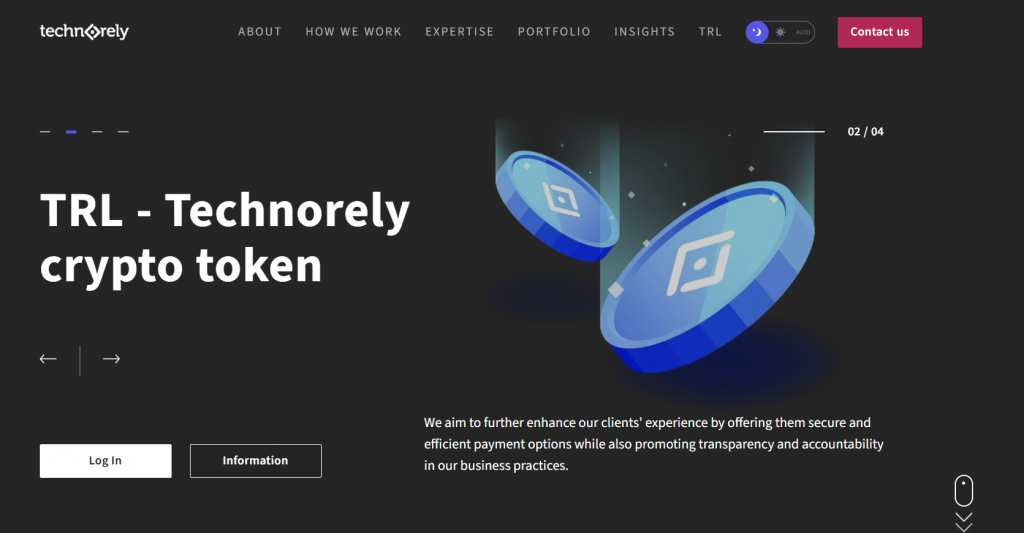
- Headquarters & Founded: A Canadian-American firm headquartered in Vancouver, Canada (with an office in Washington, DC) founded in 2018.
- DEX/Exchange Services: Markets itself as a fintech developer offering automated trading platforms, digital wallets, and cryptocurrency exchange development.
- Industries: Specializes in Fintech as well as Healthcare, Industrial, and Blockchain sectors.
- Notable Projects: Notably built a “customer-beloved global online payment system” including a multi-currency wallet supporting payments in 200+ countries at local rates.
- Trust Triggers: A Clutch Premier Verified partner with a 5.0 overall rating. Its leadership emphasizes proactive, high-quality service, earning it repeat clients across Europe and the US.
OmiSoft
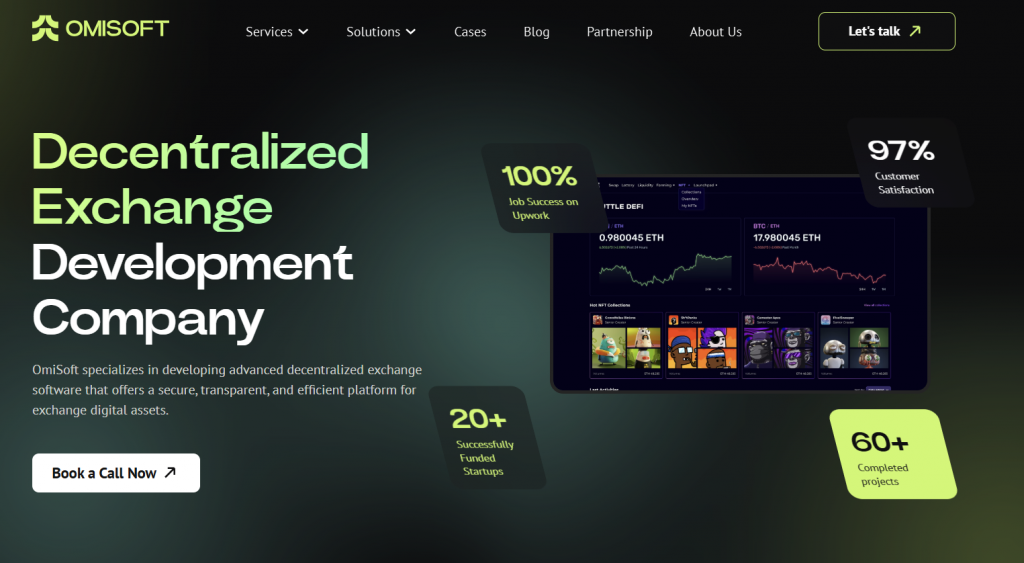
- Headquarters & Founded: Software development firm based in Kyiv, Ukraine (also with an office in Tallinn, Estonia) founded in 2017.
- DEX/Exchange Services: Offers full-cycle DeFi/DEX development. Its website highlights features like decentralized token swaps, liquidity pool management, staking systems, and custom fee management to build secure, self-sustaining DEX platforms. Additional modules include multi-asset support, wallet integration, KYC/AML, referral/rewards, and real-time analytics.
- Industries: Focuses on Blockchain and AI solutions but serves a broad range, including Healthcare, Finance (including cryptocurrency and FinTech), Real Estate, Telemedicine, and Insurance.
- Notable Projects: Its portfolio includes DEX and DeFi projects; for example, case studies mention decentralized exchange builds and integrations with popular blockchain ecosystems.
- Trust Triggers: Premier Verified on Clutch with a perfect 5.0 rating from 25 reviews. The company is promoted as a “leading Web3 & AI solutions” provider, and its clients praise timely delivery and expertise.
Aegas Inc.
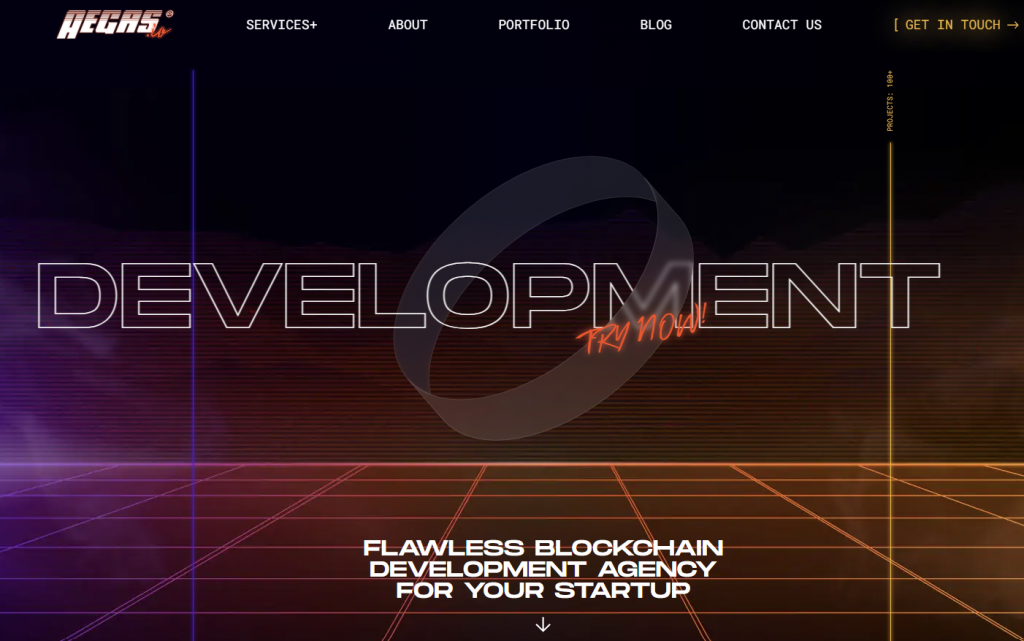
- Headquarters & Founded: An international blockchain dev agency (with offices in Kyiv, Ukraine; Budapest, Hungary; and Delaware, USA) founded in 2017.
- DEX/Exchange Services: Offers comprehensive DeFi services. Its site lists “DeFi Exchange Development”, along with development of staking and liquidity platforms, tokens, smart contracts, and DeFi dApps.
- Industries: Primarily targets Web3/crypto and startups, though it does general blockchain consulting. Key sectors aren’t explicitly listed, but marketing materials highlight NFT, DAO, DEX, and IDO projects.
- Notable Projects: Prominent for custom blockchain and NFT solutions (for example, DAO launchpads, NFT marketplaces, and crypto exchanges). Its site shows many blockchain projects and awards (e.g. “Top Clutch Blockchain Company” badges).
- Trust Triggers: Clutch Premier Verified with a 4.9 overall rating. Clients praise its flexibility, responsiveness, and technical skill. The Aegas team also highlights partnerships and featured awards on its site.
WeSoftYou (WSU)
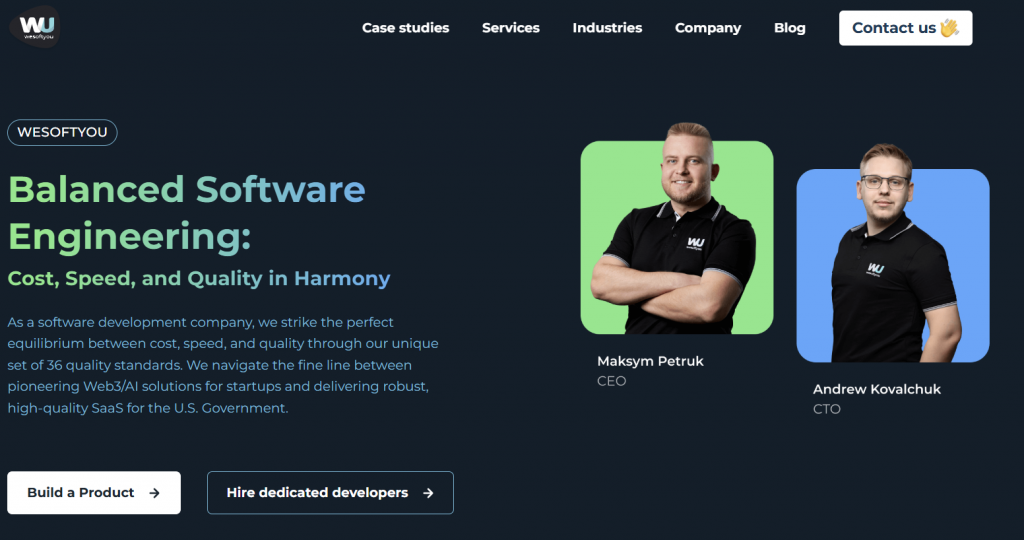
- Headquarters & Founded: A US-Ukraine software house based in Miami, Florida (with R&D in Kyiv, Ukraine), founded in 2018.
- DEX/Exchange Services: A full-stack Web3 agency; offers DeFi development such as yield farming, staking platforms, and crypto trading platforms. Its services menu includes “DeFi Staking Platform Development”, “DeFi Lending Platform Development”, and “Cryptocurrency Exchange Development”.
- Industries: Serves startups and enterprises across government, FinTech, EduTech, healthcare, retail, social media, and crypto sectors. It counts the U.S. government, Fortune 500, and VC-backed firms among its clients.
- Notable Projects: Known for balanced “Web3/AI solutions for startups” and robust enterprise SaaS.
- Trust Triggers: Highly awarded — e.g. featured as “Top Blockchain Company 2024”, “Inc. 5000 Company 2025”, Forbes Tech Council member, etc. On Clutch, it holds a 5.0 rating (29 reviews), and highlights global accolades (Payoneer, Clutch, Forbes).
QIT Software
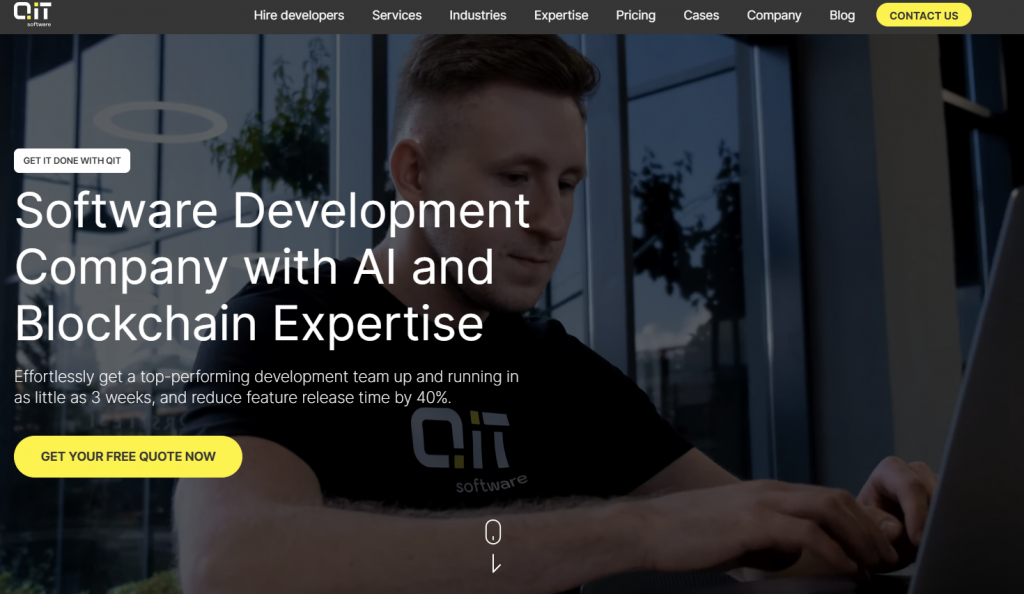
- Headquarters & Founded: A Europe–US outsourcing firm, founded in 2020. Headquarters in Tallinn, Estonia. It has 15–25 employees and emphasizes remote team extension.
- DEX/Exchange Services: While primarily a staff-augmentation firm, QIT lists blockchain/smart contract development among its services. A showcased case study is a user-friendly crypto exchange for a FinTech client: a decentralized trading platform with mobile apps. This project included multi-chain NFT marketplace features and yield (liquidity pool) integrations (Beefy.finance pools on Avalanche/Polygon), as well as a native token for fees and staking.
- Industries: The company serves Finance (crypto/fintech), Healthcare, Logistics/Transport and others. The crypto exchange case study (in finance) exemplifies their fintech work.
- Notable Projects: Aside from the exchange case, QIT highlights custom software in healthcare and logistics.
- Trust Triggers: According to Vendorland, QIT is a “leading software development company” with international clients.
Owebest Technologies

- Headquarters & Founded: An Indian-origin IT services company headquartered in Jaipur, Rajasthan; founded in 2016. It has development centers across India and overseas sales offices (USA, Canada, Dubai). Owebest is CMMI Level 3 and ISO certified (notably a “Global CMMI Level 3 Appraised Company”).
- DEX/Exchange Services: Offers broad blockchain solutions, including custom decentralized exchanges. Their services page explicitly mentions building “powerful decentralized exchange platforms that are hack-proof” for iOS/Android, enabling real-time crypto trading. Other blockchain offerings include tokenization, NFT marketplaces, wallets, and consulting.
- Industries: A full-spectrum digital agency; beyond blockchain, it builds mobile/web/ERP/CRM software for finance, retail, healthcare, e-commerce, and more (multiple services and industry sections on site).
- Notable Projects: Portfolios highlight fintech and enterprise solutions, and they tout an “exhaustive experience” in complex custom projects. Specific blockchain clients aren’t named, but having offices worldwide indicates international engagements.
- Trust Triggers: Marketed as a “pre-eminent IT company” in Jaipur. It is listed on Clutch as Premier Verified, with a 4.9 rating from 25 reviews. They emphasize ISO/CMMI certifications and publish numerous awards (Clutch Top Developer badges, etc.) to reinforce credibility.
Key Trends Driving DEX Development in 2025 and Beyond
In order to be at the leading edge of DEX development, it’s about getting ahead of what’s coming next. Leading vendors already have these integrated into their platforms:
Multi-Chain / Cross-Chain Exchange
Humans want seamless exchanges between chains. Top DEX engineers are building bridges and atomic-swap functionality so that traders can move assets from one chain to another, from Ethereum to BNB Chain to Solana, etc. For example, frameworks like Polkadot and Cosmos enable the cross-network liquidity concept.
DEX development today also typically works on interoperability: exchanges like OpenOcean literally route across chains. Chains such as BNB Chain, Polygon, and Optimism are “more and more vital,” and multi-chain aggregators are exploding in usage.
Liquidity Aggregation
Liquidity on DEXs is still fragmented. To offer competitive rates, new DEX platforms leverage liquidity aggregation. Companies are either building or integrating with aggregators (think 1inch, ParaSwap, or UniswapX) to pull liquidity from a range of AMM pools. This combined approach reduces slippage and increases trading effectiveness. For instance, protocols like Orbs’ Liquidity Hub combine smaller DEXs into broad pools of liquidity.
In short, liquidity hubs and cross-DEX routing are leading trends in 2026.
AI-Trading and Market Making
AI is revolutionizing DEX design. Advanced businesses now offer AI/ML platforms for trade execution and automated market-making. AI agents will maximize liquidity deployment and even “predict market trends” to maximize fee levels and orders.
AI-trading provides a more secure, efficient, and user-friendly DEX environment. Prepare to see AI-driven price-oracle feeds, smart liquidity bots, and even custom trading advice baked into next-generation DEX apps.
Regulatory Compliance
As DeFi makes it onto regulators’ agendas, compliance-focused DEX models are gaining traction. Vendors are introducing KYC/AML on-ramps and audit hooks. We suggest deciding whether your use case needs AML/CFT. Most developers now incorporate identity gateways or zero-knowledge proof modules to balance privacy and law. Selecting providers with FATF/Travel Rule experience is wise: sound integration of KYC can significantly reduce regulatory risk. More DEXs should offer opt-in compliance to institutional capital.
Gamified & Social DeFi Features
To spur adoption, some DEXs are adding gamification and social aspects. Features like trading tournaments, referral incentives, and “social swap” interfaces are all on an upward trend. Early DEX initiatives are experimenting with UI elements (leaderboards, achievement badges) to make trading more interactive.
Teams are investing in educational resources and gamified interfaces to onboard larger segments. Locate DEX vendors that can incorporate such learning and community elements into their DEX UX.
Final Tips Before Partnering With a DEX Developer
Here is a quick checklist for you:
- Specify your needs. Decide beforehand whether you need a completely custom DEX or a white-label one. White-label solutions can speed up launch appreciably and save costs (there are firms that boast of deploying DEX within weeks), but limit customization. Custom builds are more labor-intensive, but offer total feature and scale control. Choose your selection against your budget and timeline.
- Enforce compliance. If you are serving regulated markets or fiat gateways, make sure that your vendor is capable of applying KYC/AML screening. Ask how they approach compliance “out of the box” and if they can adapt to geo-specific laws. Security and regulatory readiness often accompany each other in vendor proposals.
- Liquidity support. Describe how the team will help stimulate liquidity. Do they seed pools, work with market makers, or get listed on aggregators? There should be liquidity mining, token airdrops, or CEX listing plans for an efficient DeFi exchange development agency. Query whether there is interoperability with known liquidity providers or launchpads.
- Post-launch roadmap. Check their maintenance and support strategy. Ensure that the contract includes ongoing monitoring, smart-contract auditing at regular intervals, and updates to scale. For example, IdeaSoft values ongoing optimizations and security patches after launch. Your exchange should scale (new features, chains, forks) without prolonged downtime.
The right partner will help you after launch — help your exchange grow healthily. By checking these off the list, you’ll be ready to move forward with confidence.
Conclusion
Choosing a DEX development partner is perhaps the most important decision a DeFi project can make. The companies mentioned above are a vetted cross-section of DEX development companies with proven track records of success in 2026. Some are famous for rapid white-label deployments, others for custom, cutting-edge solutions – but all value security, performance, and high-quality support. Ultimately, the partner you choose should fit your vision, whether that’s a strongly customized multi-chain exchange or a slimmed-down AMM platform. Compare their product offerings carefully, look at their previous work, and consider long-term scalability and compliance.
Meet these top DEX development teams, assess their competencies, and choose the team that best aligns with your vision for DeFi. The right development partner will not only build your exchange but also make it prosper as the market evolves.
Start your DEX project today!
See how we’ve helped businesses launch successful decentralized exchanges
